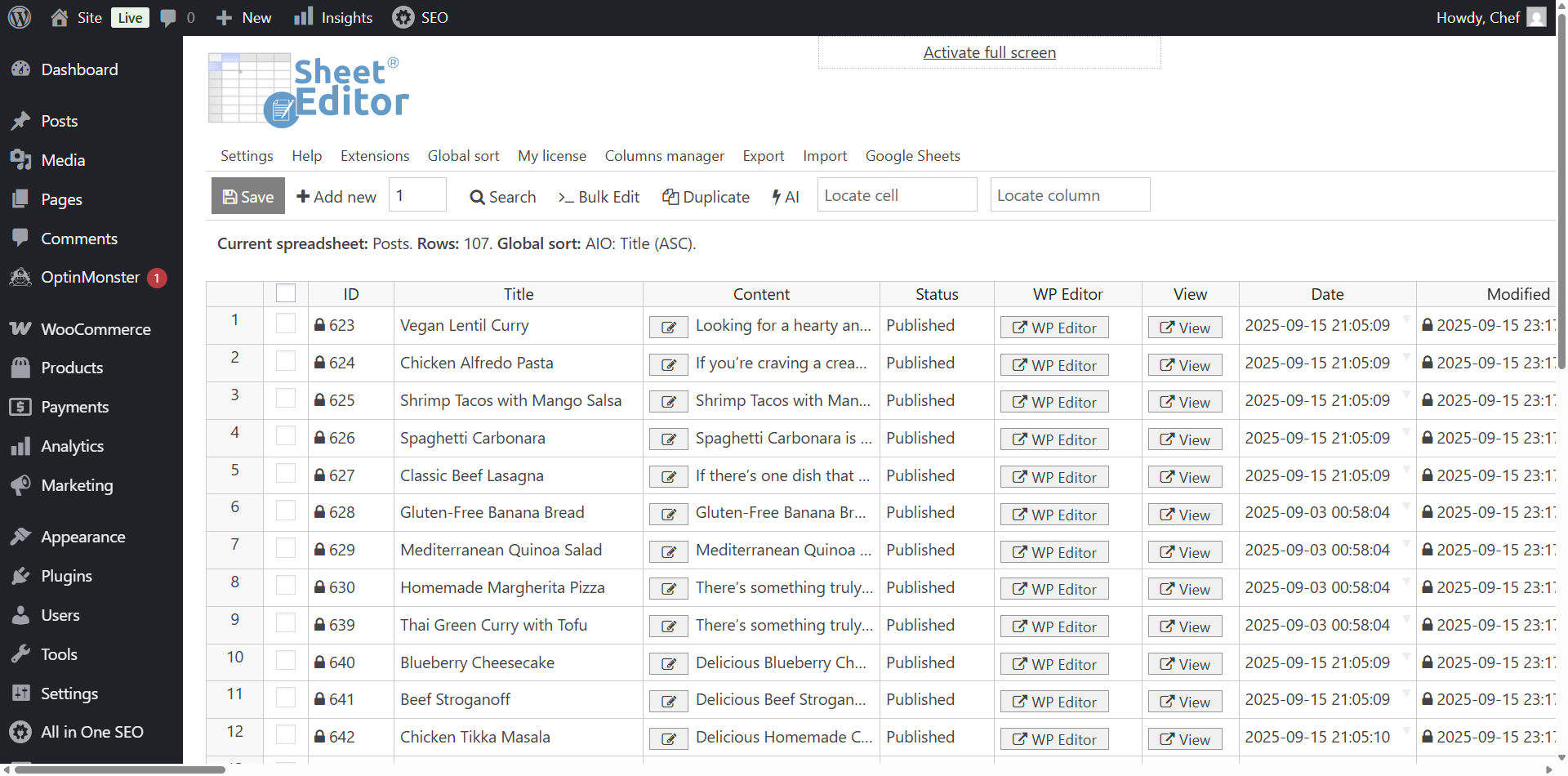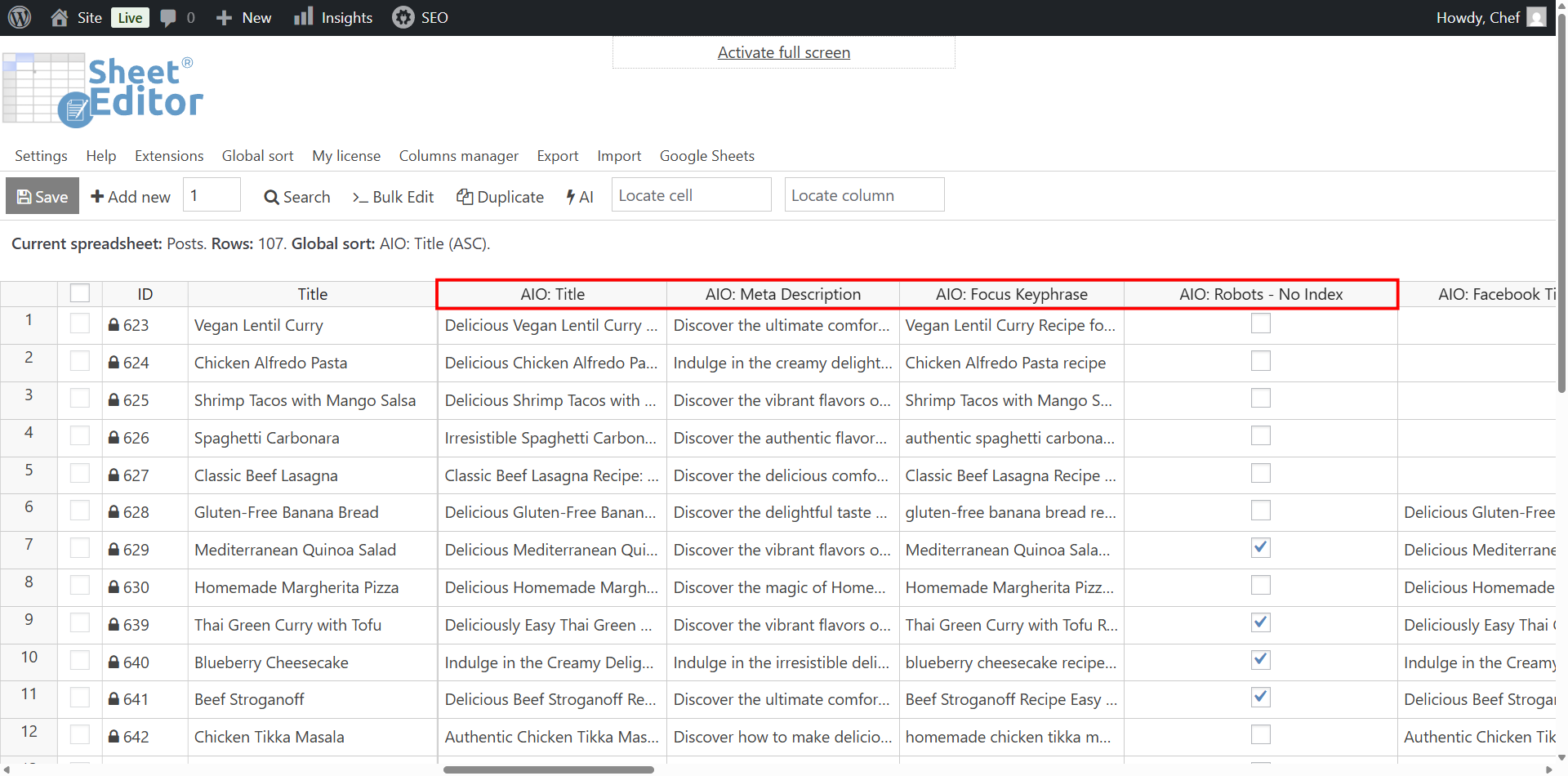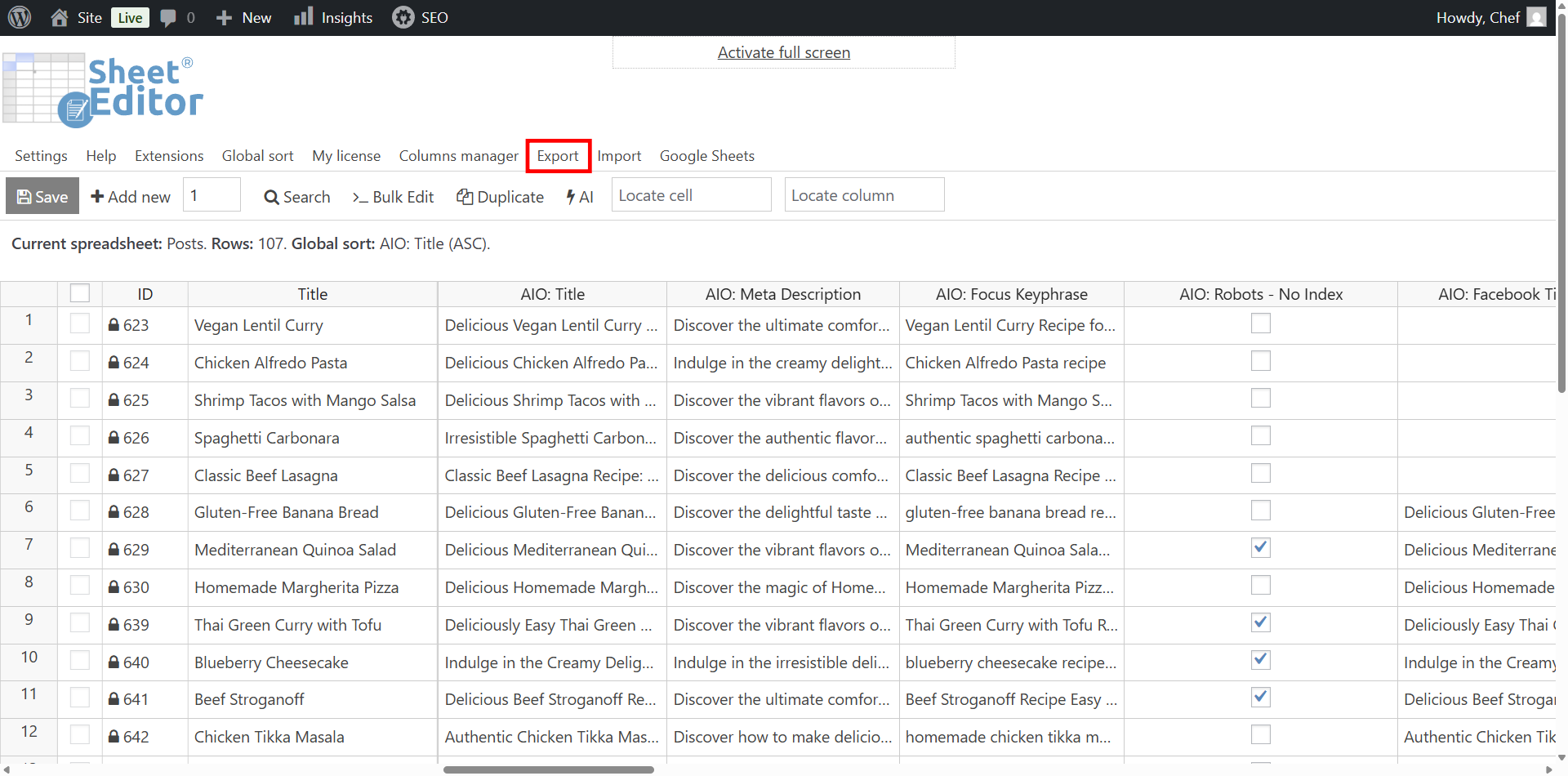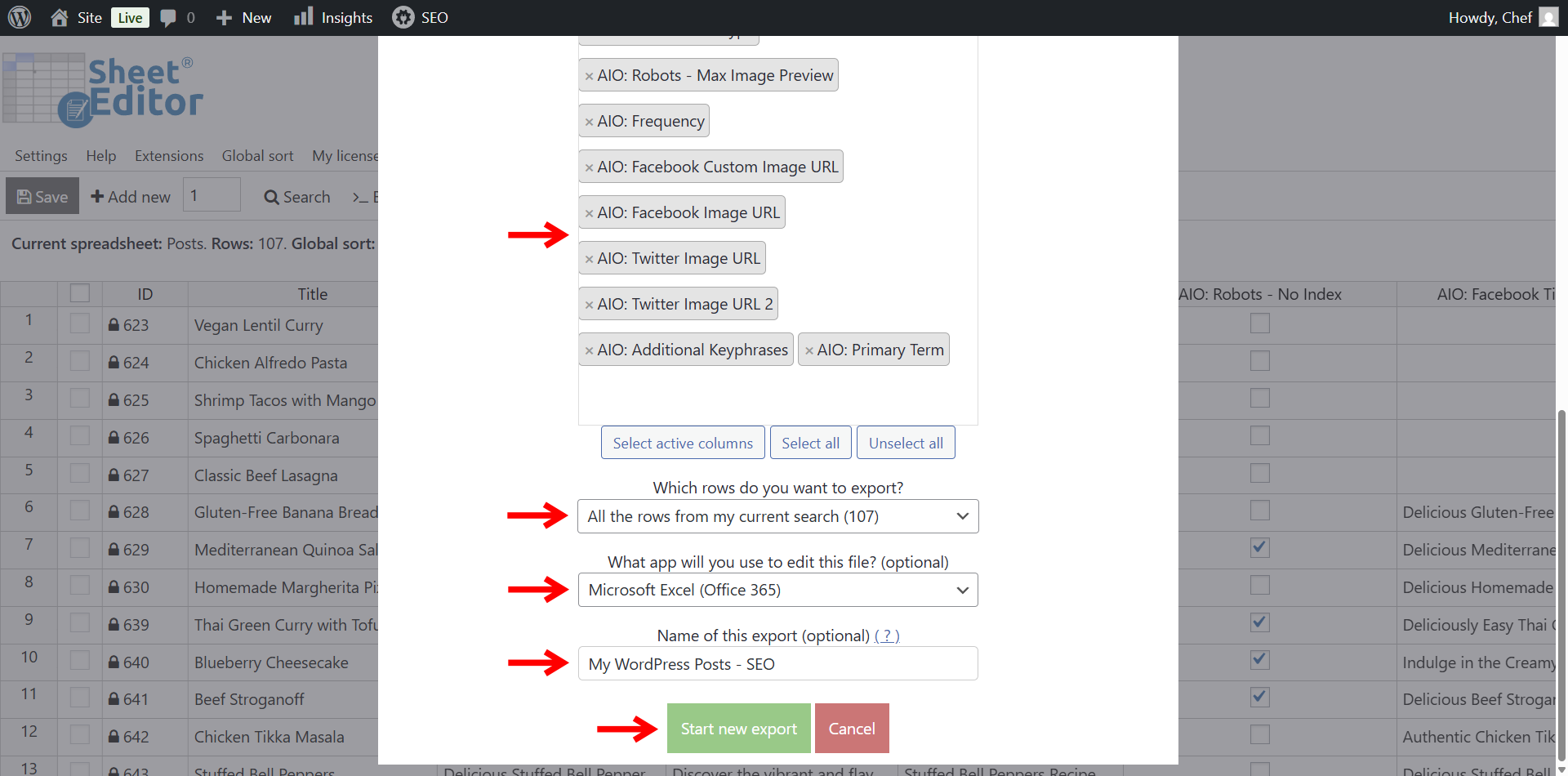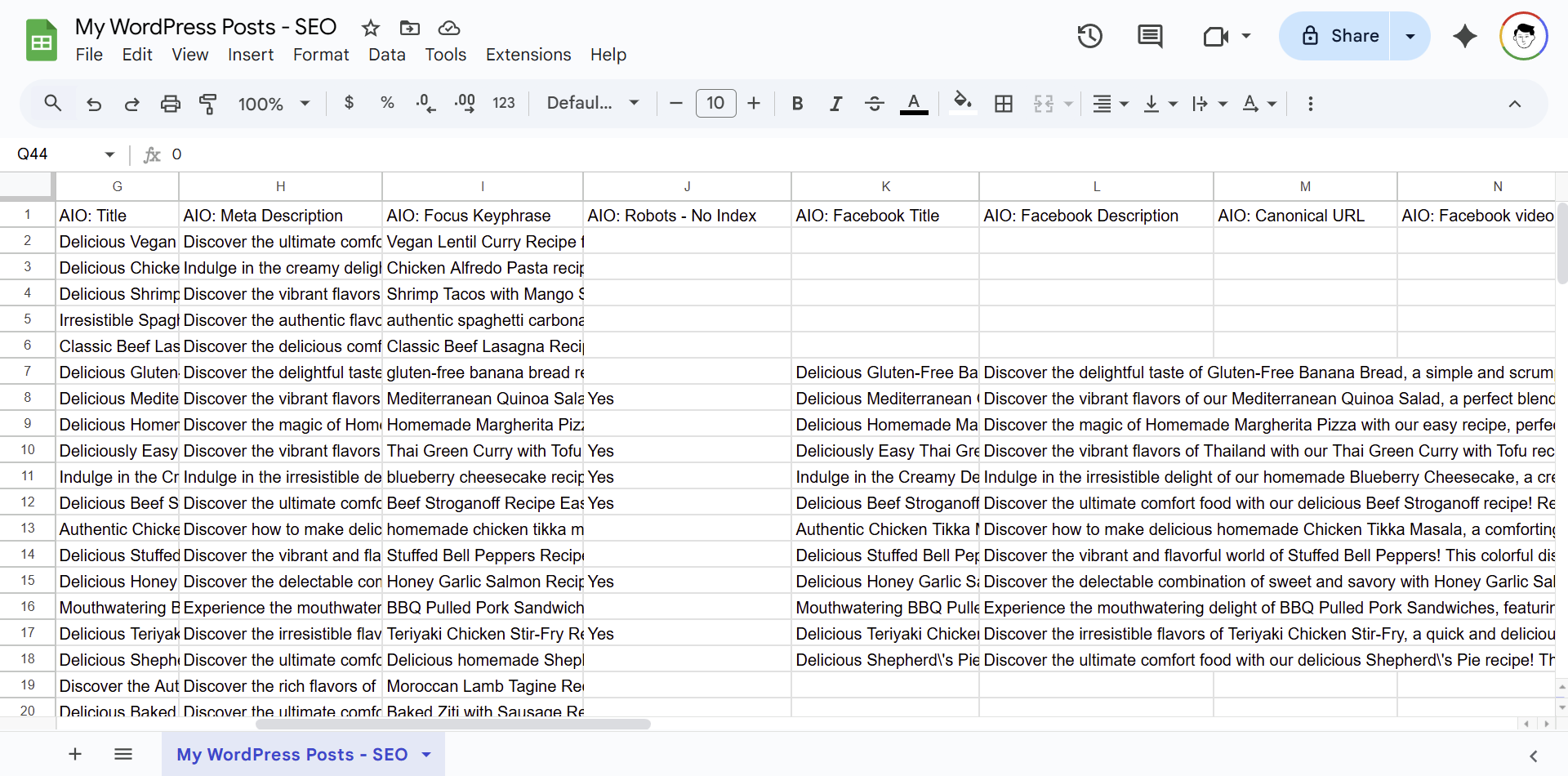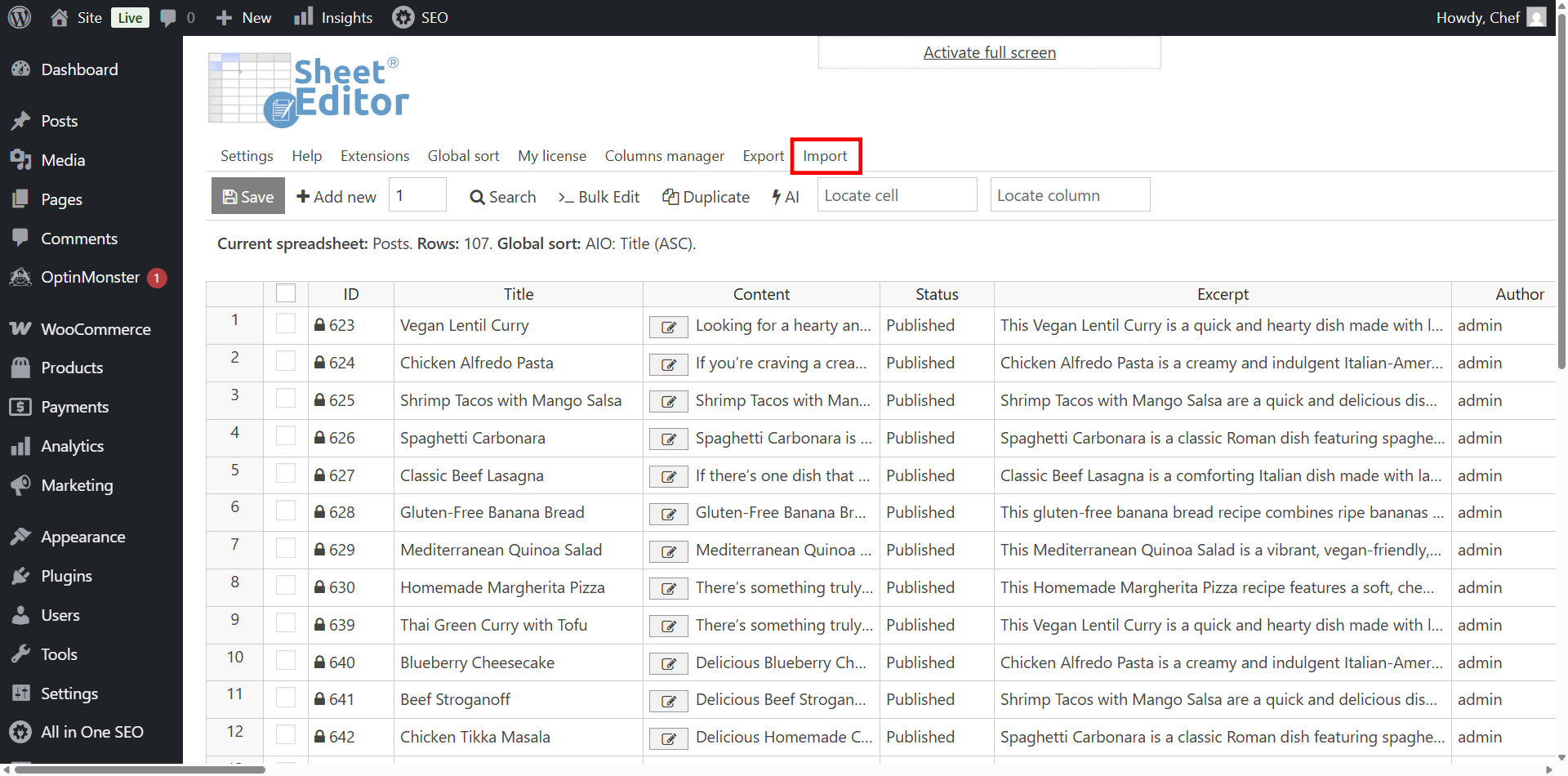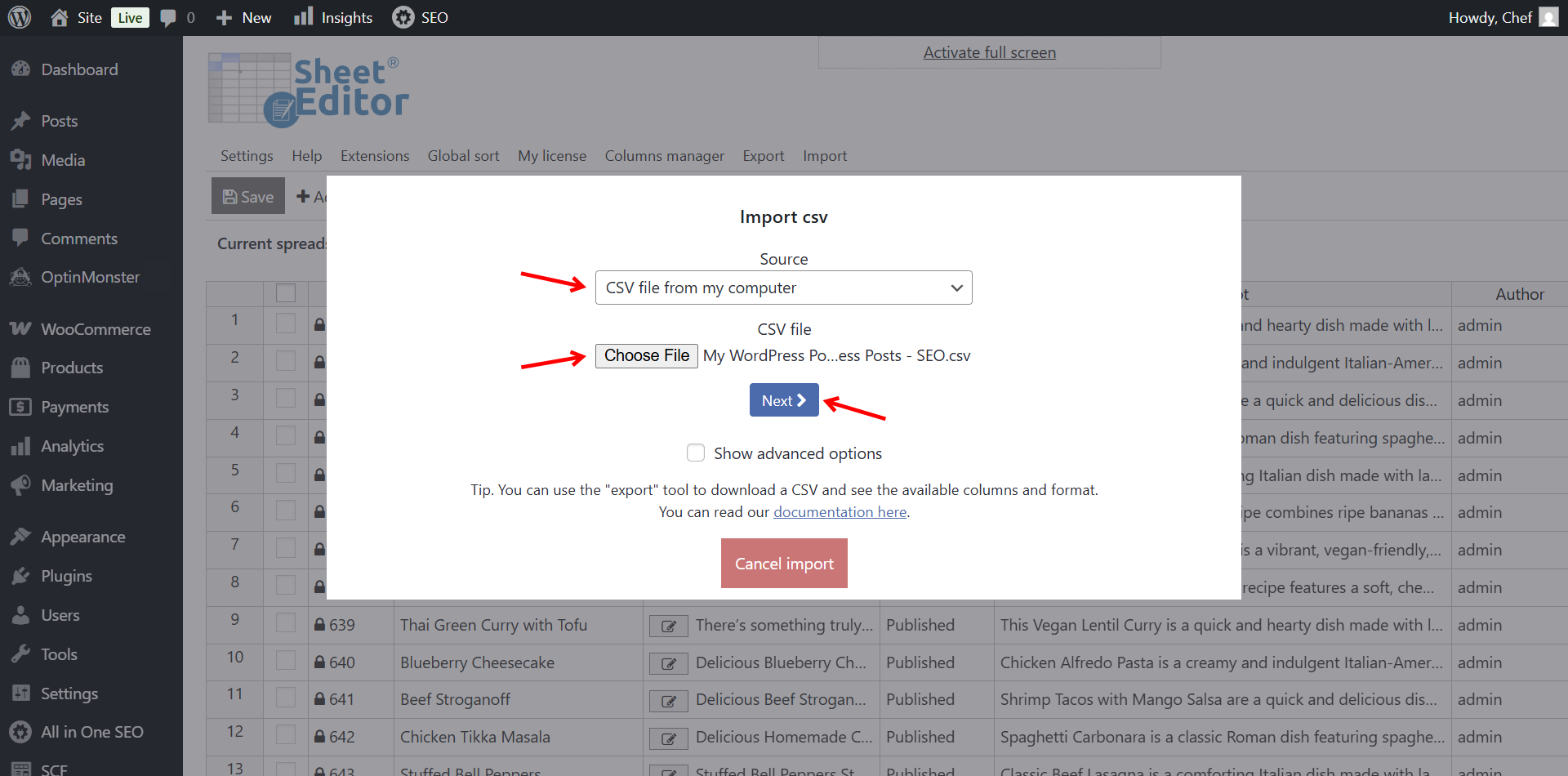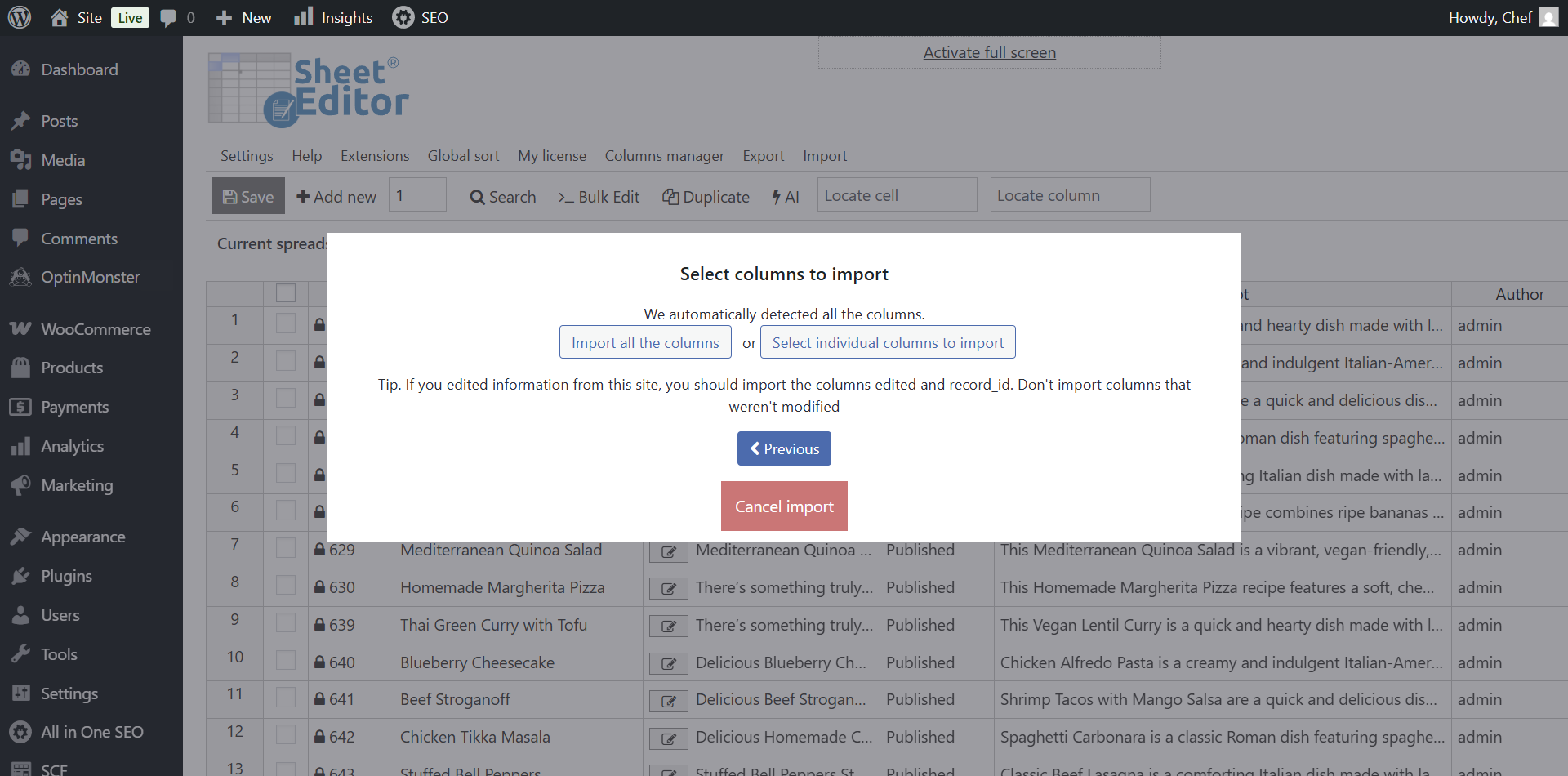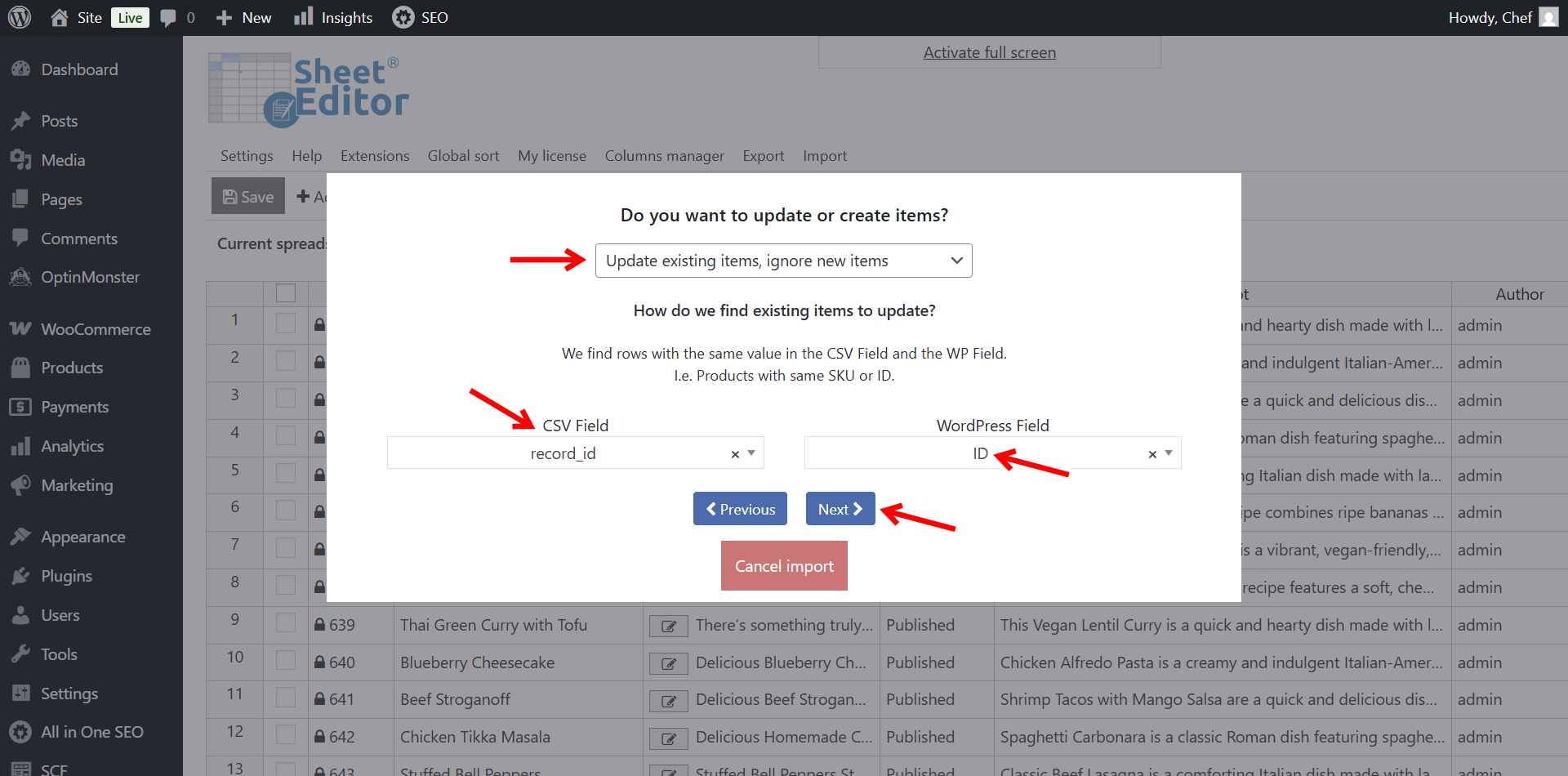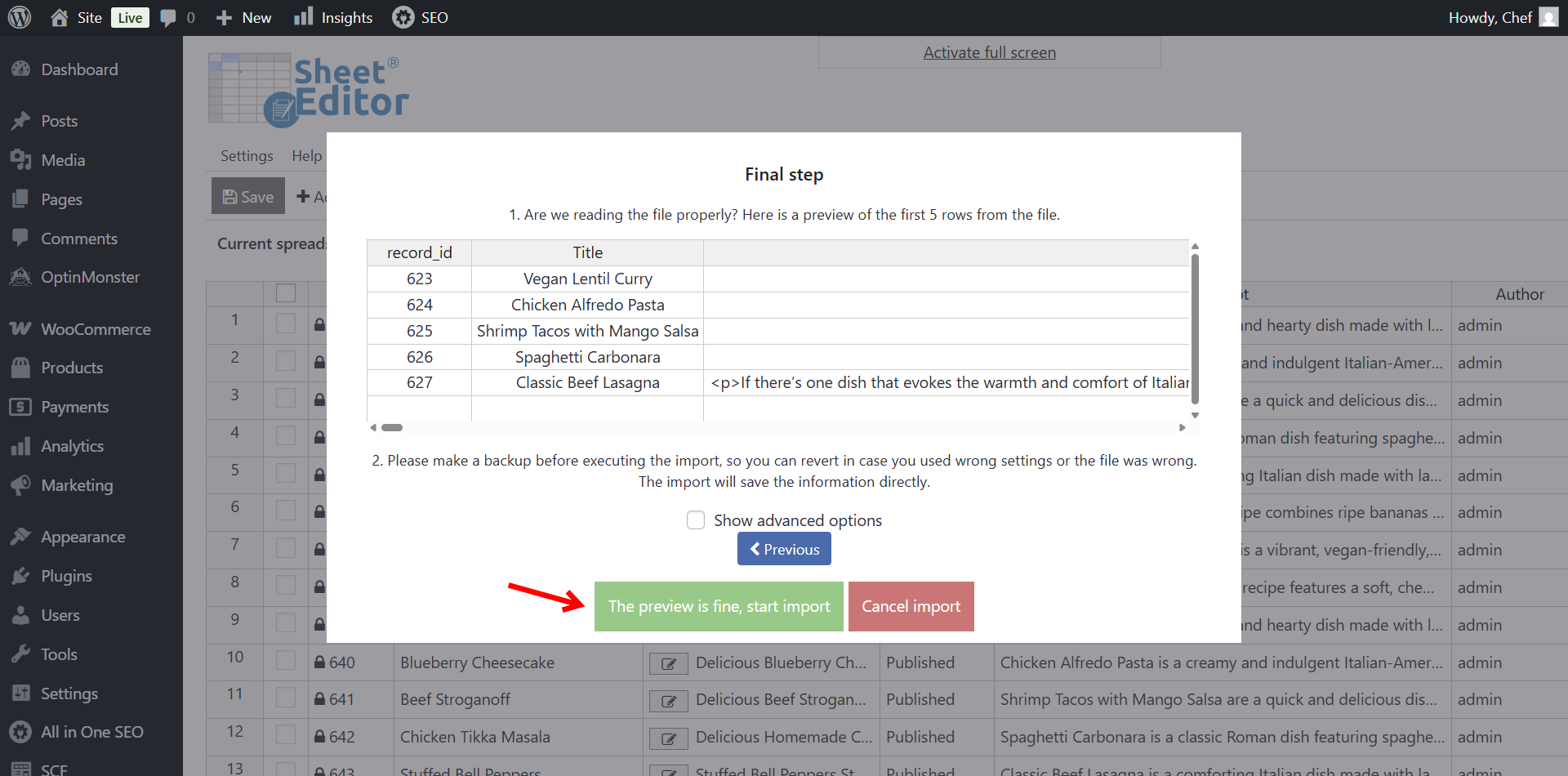Managing SEO data for your WordPress site can be time-consuming, especially when dealing with hundreds of posts or pages. All In One SEO (AIOSEO) stores key SEO information like titles, meta descriptions, keywords, and social media settings as post meta. With WP Sheet Editor, you can export this data to a CSV file for backup, editing, or migration, and then import it back efficiently. This tutorial shows you how to do it step by step. And the best part: no coding needed!
Related tutorial: Bulk Edit All In One SEO Data in a Spreadsheet
Why export and import AIOSEO SEO data?
Exporting and importing All In One SEO data offers several benefits:
- Backup and restore: Create a backup of your SEO settings before making changes, and easily restore if needed.
- Bulk optimization: Export data to edit offline (e.g., optimize titles and descriptions in a spreadsheet tool like Excel), then import updates in bulk.
- Migration: Transfer SEO data from one site to another during site moves or staging to production.
- Collaboration: Share CSV files with SEO experts without granting site access.
- Efficiency: Avoid manual editing of each post or page in the WordPress editor.
Tools to export and import AIOSEO SEO data
To follow this tutorial, you’ll need:
All In One SEO (AIOSEO): We assume you already have this plugin.
WP Sheet Editor – Post Types: This plugin lets you manage posts, pages, and custom post types in a spreadsheet interface, including editing custom meta fields like those from AIOSEO.
You can download the plugin here:
Download Posts, Pages, and Custom Post Types Spreadsheet Plugin - or - Check the features
WP Sheet Editor – All In One SEO: This extension is free for WP Sheet Editor users. It adds full compatibility between WP Sheet Editor and All In One SEO, so you can easily edit all SEO fields in the spreadsheet.
Step 1: Open the Posts Spreadsheet
When you install and activate WP Sheet Editor – Post Types, it automatically creates spreadsheets for posts, pages, and WooCommerce products. If you need a spreadsheet for a custom post type, you can set one up easily by following this guide.
For this tutorial, we’ll use the posts spreadsheet as an example.
In your WordPress dashboard, go to WP Sheet Editor > Edit Posts. This opens a spreadsheet displaying all your WordPress posts. Each row represents a post, with columns for standard fields like title, content, and categories.
Custom meta fields from AIOSEO will also be displayed in the spreadsheet.
Important. If you don’t see the All In One SEO columns, here are some things you can do:
- Go to Settings > Scan DB to find fields.
- Use the Columns Manager to activate the columns to be displayed in the spreadsheet.
WP Sheet Editor supports all AIOSEO fields, including:
- Title
- Meta Description
- Focus Keyprase
- Canonical URL
- SEO Score
- Pillar Content
- Additional Key phrases
- Keywords
- Primary Term
- Facebook Title
- Facebook Description
- Facebook Video
- Facebook Image Width
- Facebook Image Height
- Facebook Custom Image URL
- Facebook Image URL
- Facebook Object Type
- Twitter – Use Facebook Data
- Twitter Image URL
- Twitter Image URL 2
- Twitter Title
- Twitter Description
- Twitter Card Type
- Robots – Default
- Robots – No Index
- Robots – No Archive
- Robots – No Snippet
- Robots – No Follow
- Robots No Image Index
- Robots – Max Image Preview
- Limit Modified Date
- Frequency
Step 2: Export All In One SEO data to a CSV file
Let’s see how to export fields related to the All In One SEO plugin to a CSV file that you can open with Excel, Google Sheets, or any other CSV editor.
In the WP Sheet Editor toolbar, click the Export button.
Select these values to configure the export:
- What columns do you want to export? You can select Specific columns. The columns from the All In One SEO plugin contain the “AIO:” prefix, so you’ll have AIO: Title, AIO: Meta Description.
- Which rows do you want to export? You can export all rows, all rows from a specific search, or all manually selected rows.
- What app will you use to edit this file? You can select different apps; in this example, we will select Microsoft Excel (Office 365).
- Click Start new export to download the CSV file.
The CSV will contain your selected columns, ready for editing in tools like Excel or Google Sheets.
Step 3: Edit the SEO Data in the CSV File
Open the exported CSV in your preferred spreadsheet editor (e.g., Microsoft Excel, Google Sheets, etc.).
- Update the AIOSEO fields as needed (e.g., optimize titles, add keywords).
- Keep the ID column unchanged; it’s crucial for matching during import.
- Save the file as a CSV when done.
Step 4: Import the Updated SEO Data
Now, let’s see how to import the edited CSV back into WordPress. Importing SEO data from the CSV file is great to update SEO for hundreds of posts at once!
In the WP Sheet Editor toolbar, click the Import button.
Once you’re in the Import tool, you need to select the CSV file you will import into your site:
- Source: CSV file from my computer.
- Click on Choose File and locate the CSV file you will upload.
- Click Next.
Next, select the columns to import. You can Import all the columns or Select individual columns to import and map them (e.g., map your CSV column to the corresponding AIOSEO meta key like _aioseo_title).
Choose how you want to import your data:
- Do you want to update or create items? We will Update existing items, ignore new items.
- How do we find existing items to update: We will use the record_id column and the ID field to match and update existing items.
- Click Next to preview the changes.
If the preview looks correct, click The preview is fine, start import.
WP Sheet Editor will update the All In One SEO data in batches to avoid server issues.
Exporting and importing SEO data from All In One SEO using WP Sheet Editor is straightforward and powerful. By enabling AIOSEO meta columns and using the export/import tools, you can manage your SEO settings in bulk, saving time and reducing errors. Whether you’re optimizing a large site or migrating data, this process keeps your SEO efforts efficient. Say goodbye to manual updates and hello to streamlined workflows!

